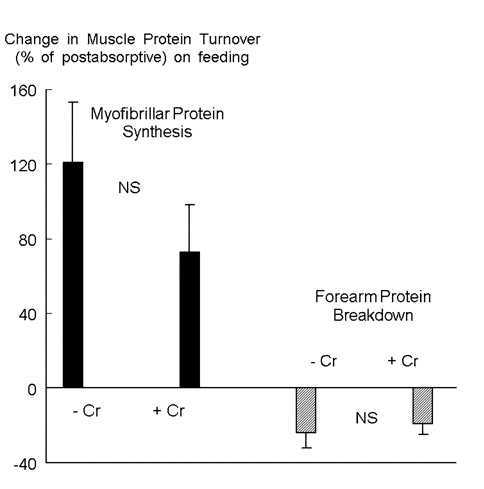Creatine supplementation reportedly increases muscle mass in physically active persons but the mechanism is unknown. There is no effect of creatine supplementation on muscle protein synthesis measured in the post-absorptive state in physically inactive individuals (Parise et al. 2001). However, the effects of creatine on muscle protein synthesis are untested in the fed state, when any anabolic stimulus would be enhanced by an increased supply of amino acids. Furthermore, nothing is known of the effects of creatine on muscle protein breakdown. To investigate these possibilities we studied the effects of creatine supplementation in six healthy men (25 ± 4 years, BMI 21 ± 3; means ± S.E.M.). The Ethics Committees of the ULB and the Hospital Erasme, Bruxelles gave approval. We used a protocol that allowed two measurements within 5.5 h of both muscle protein synthesis (by incorporation of [1-13C] leucine) and breakdown (as dilution of D5-phenylalanine across the forearm). For the first 3 h the subjects were post-absorptive but for the next 2.5 h they were fed orally at the rate of 0.3 g maltodextrin and 0.083 protein (kg body wt)-1 h-1. Measurements were made twice, 2 weeks apart, the second study occurring after the subjects had ingested creatine at 20 g day-1 for the last 5 days. Measurements of blood 13C α-ketoisocaproate and D5-phenylalanine were made by gas chromatography mass spectrometry; measurements of the incorporation of [13C] leucine into myofibrillar protein (separated from needle biopsy samples of m. vastus lateralis by salt extraction, centrifugation and hydrolysis) were made by gas chromatography combustion mass spectrometry.
Myofibrillar protein synthesis (basal ~0.043 % h-1) was stimulated by feeding, to the same extent on both occasions (Fig. 1). However, there were no changes in the rates of muscle protein synthesis (either post-absorptive or fed) as a result of creatine supplementation. Furthermore, although feeding inhibited forearm protein breakdown (basal ~1016 nmol phenylalanine (forearm)-1 min-1), there were no effects of creatine. Any effect of creatine in stimulating muscle turnover must only occur in conjunction with enhanced activity, such as resistance exercise.

